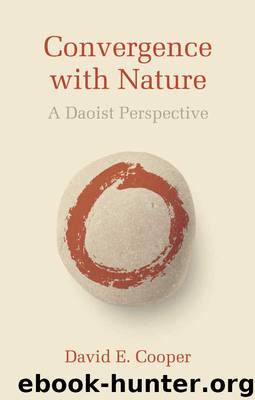Convergence with Nature by David E. Cooper

Author:David E. Cooper
Language: eng
Format: epub
Publisher: UIT Cambridge Ltd.
Anstruther, a fishing village in Fife.
Indeed, for Laozi and Zhuangzi, a professional scientific stance towards nature might obstruct mindfulness. For it is a stance which is too dogged, too much dictated by a ground plan, too rigidly focused on the achievement of goals – overturning a hypothesis about bird behaviour, discovering a new species of reptile, identifying a plant’s medical potential, finding the cause of a tree blight, or whatever. The Huainanzi remarks that “those who have investigated things ultimately rest with non-action (wu wei)”. Whether or not there was a truth to this remark in the context of second-century-BCE Chinese cosmological enquiry, it could not be plausibly maintained that wu wei – the relaxed spontaneity advocated by Daoism – is a feature of modern scientific practice.
If mindful experience of nature is neither ‘pure’ and concept-free nor confined to experts, how, in a word, might it be characterised – a word that would gather together the aspects of mindfulness which have been emerging over the last few pages? Shortly, I’ll propose such a word, but first a few remarks on a theme in the Zhuangzi which inspires the proposal.
This is the theme of yu, variously rendered as roaming, rambling, wandering. We briefly encountered it earlier, when citing a famous reference to poets whose eyes and hearts-and-minds ramble among the ‘manifold riches of the earth’ (see Chapter 5, page 55). As the reference indicates, roaming is a metaphor, drawn from a loose and easy style of exploring nature, for a way of experiencing things. The sage, it is said, is a roamer: hence, like a free-spirited backpacker – the Wanderer celebrated in German Lieder – he is unconcerned with profit, destinations, goals, obligations or commitments, and eschews analytical enquiry which “chops things into pieces” (Z 5).
The metaphor is elaborated in Guo Xiang’s commentary on a passage from Chapter 1 of the Zhuangzi (‘Roaming without a destination’) which refers to the wandering of the sage’s heart-and-mind. The sage is implicitly compared to the leisurely rambler who allows himself to be guided by shifting terrains and glimpses of new vistas, who becomes absorbed in the landscape, and – without a fixed destination – enjoys a sense of freedom in the environment through which he journeys. The sage’s mind, analogously, “wanders in the paths of transformation”, “follows along with the character of each thing”, is expansive and “unfettered”, “free of dependence . . . unobstructed”, and is delivered from an opposition of “self and other” which occludes an attentive openness to things.11
We’ll see in a later chapter that roaming is not merely a metaphor, for rambling in landscapes is itself edifying. It at once represents and nurtures mindful experience. That’s why the wandering of the sage’s heart-and-mind is enhanced by “being in a vast mountain forest” (Z 26).
Partly inspired by the theme of roaming in the Zhuangzi, here is the word I propose for characterising mindfulness: reverie. A more immediate inspiration is a much later work whose very title relates rambling to an attunement to nature – Jean-Jacques Rousseau’s Reveries of a Solitary Walker.
Download
This site does not store any files on its server. We only index and link to content provided by other sites. Please contact the content providers to delete copyright contents if any and email us, we'll remove relevant links or contents immediately.
Tools of Titans by Timothy Ferriss(8394)
Turbulence by E. J. Noyes(8049)
Secrets of Antigravity Propulsion: Tesla, UFOs, and Classified Aerospace Technology by Ph.D. Paul A. Laviolette(5371)
Astrophysics for People in a Hurry by Neil DeGrasse Tyson(5189)
Room 212 by Kate Stewart(5120)
Design of Trajectory Optimization Approach for Space Maneuver Vehicle Skip Entry Problems by Runqi Chai & Al Savvaris & Antonios Tsourdos & Senchun Chai(5068)
Pale Blue Dot by Carl Sagan(5008)
The David Icke Guide to the Global Conspiracy (and how to end it) by David Icke(4718)
A Journey Through Divination and Astronomy by Publishing Pottermore(4385)
Goodbye Paradise(3810)
Apollo 8 by Jeffrey Kluger(3708)
COSMOS by Carl Sagan(3624)
The Five People You Meet in Heaven by Mitch Albom(3568)
Losing the Nobel Prize by Brian Keating(3535)
How to Read Water: Clues and Patterns from Puddles to the Sea (Natural Navigation) by Tristan Gooley(3469)
Brief Answers to the Big Questions by Stephen Hawking(3435)
How to Read Nature by Tristan Gooley(3341)
The Order of Time by Carlo Rovelli(3193)
A Brief History of Time by Stephen Hawking(3024)
